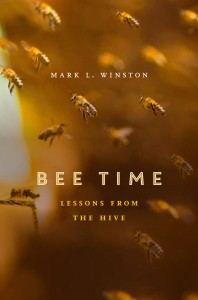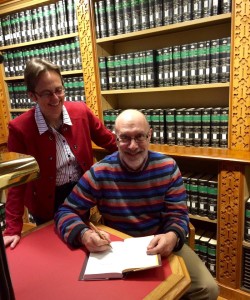Signing “Bee Time” at the Parliamentary Library, 2015 Governor-General’s Literary Award for Nonfiction
Available in hardcover at most bookstores, but I encourage you to visit your local independent book seller as the independents have been superlative in supporting “Bee Time,” and in their commitment to maintaining literary culture.
“Bee Time” is also available in hardcover/paperback, ebook and audiobook at:
Harvard University Press: http://www.hup.harvard.edu/catalog.php?isbn=9780674368392
Audiobook: from Audible
2016 Korean edition, Hongik Publishing
2017 Italian edition, il Saggiatore s.r.l.
Awards
2014 Science in Society General Book Award, Canadian Science Writers Association
2015 Governor-General’s Literary Award for Nonfiction “In his exquisite Bee Time: Lessons from the Hive, Mark L. Winston distills a life’s devotion to the study of bees into a powerful and lyrical meditation on humanity. This compelling book inspires us to reevaluate our own relationships both with each other and the natural world. Vital reading for our time.” Jury Statement, Governor-General’s Literary Award for Nonfiction
2015. CBC Best Books of 2015
2016. Seven months on national bestseller lists, including four weeks as the number one bestselling non-fiction book in Canada
I’m available for talks/readings:
Bee Time: Lessons From the Hive:. There are powerful lessons to be learned from bees about how we humans can better understand our place in nature, engage the people and events surrounding us with greater focus and clarity, interact more effectively in our relationships and communities, and open ourselves to a deeper understanding of who we are as individuals, communities and a species. I’ll talk about my experiences over 30 years of walking into apiaries, and the lessons learned from a life spent among the bees.
Videos Bee Time talk:
Vancouver Institute Lecture, December 2016
Asheville, North Carolina National Pollinator Week, June 2015, https://youtu.be/W5i4KWoIRmY
Jacket Copy
Being among bees is a full-body experience, Mark Winston says—from the low hum of tens of thousands of insects and the pungent smell of honey and beeswax, to the sight of workers flying back and forth between flowers and the hive. The experience of an apiary slows our sense of time, heightens our awareness, and inspires awe. Bee Time presents Winston’s reflections on three decades spent studying these remarkable creatures, and on the lessons they can teach about how humans might better interact with one another and the natural world.
Like us, honeybees represent a pinnacle of animal sociality; how they submerge individual needs into the colony collective provides a lens through which to ponder human societies. Winston explains how bees process information, structure work, and communicate, and shows how corporate boardrooms are using bee societies as a model to improve collaboration. He examines how bees have altered our understanding of agricultural ecosystems, and how urban planners are looking to bees in designing more nature-friendly cities.
The relationship between bees and people has not always been benign. Bee populations are diminishing due to human impact; we can’t afford to ignore what the demise of bees tells us about our own tenuous affiliation with nature. Toxic interactions between pesticides and bee diseases have been particularly harmful, foreshadowing similar harmful effects of pesticides on our health.
There is much to learn from bees in how they respond to these challenges. In sustaining their societies, bees teach us ways to sustain our own.
“No other book celebrates the long relationship between humans and honey bees as powerfully, thoughtfully, and enchantingly as this one. Written in lyrical prose, Bee Time is a delightful and inspiring read.” Thomas D. Seeley, author of “Honeybee Democracy”
“Bee Time is a unique book: in turn a touching memoir, a warm paean to the honey bees that have fueled Winston’s impressive scientific career, and an insightful analysis of some of the serious environmental problems facing us today.” Gene E. Robinson, University of Illinois at Urbana-Champaign
Reviews
Popular/Scientific Press
The Weekly Standard: “His portrait of an ongoing conversation within the hive is, indeed, striking . . . His lyricism inspires awe of these necessary insects.” 8 September 2014
New Scientist: “A charming and poetic account, Winston writes lovingly of the rhythms and quiddities of the apiary, stepping between reportage, scientific exactitude and a deep, poetically expressed love of bees, beekeeping and the cultural forms that bees inspire . . . An insightful delight.” 21 October 2014
Nature: “From the whirr of wings to the whiff of honey, the “full-body experience” of working in apiaries has, for biologist Mark Winston, sparked insights into humanity’s relationship with nature. In this personal and scientific journey into the history we share with bees, he ranges over neonicotinoid pesticides and colony collapse, the control of African ‘killer’ bees and more. The charismatic social insects emerge as both icons of societal cohesion and symbols of nature’s paradoxically mingled power and fragility.” 30 October 2014
Open Letters Monthly: Arts and Literature Review: “Bee Time works wonderfully . . . Winston wants to acquaint his readers with the fascinating complexity of the bee world, and he also wants to alert readers to the fact that the bee world is drastically endangered. He brings to this hybrid task a very smooth ability to simplify the complex bee-literature he’s obviously mastered, providing engaging glimpses into the world of the hive – and usually presenting them in parallel context of the human world . . . Winston’s wake-up call takes on an urgency that’s belied by its friendly, approachable tone. That clarion call makes Bee Time an important book.” November 2014
Literary Review: “Winston’s argument – that the experience of interacting with a beehive is akin to the neurological state brought about by focused dialogue – is a fascinating one […] The most impressive aspect of Winston’s wide-ranging study into social and cultural appropriations of the apiary is his awareness of how NGOs in America have adopted the example of bees to enhance participatory democracy. Turning our long-standing habit of anthropomorphising bee colonies on its head, Winston draws eloquent parallels between a swarm’s ‘discussions’ on the best spot for a new nesting site and the activities of organizations like AmericaSpeaks […] And if, as Winston suggests, the answers lie within the intricate colloquies of the hive, perhaps it’s about time we let the bees tell us.” 1 November 2014
Toronto Star: “I hope this thoughtful and eloquent book will acquire an avid following. Winston is an inspired cross-pollinator, who uses the experience of being with bees to draw lessons from human hives.” 2 November 2014
Seattle Times: “Lessons from bee time are fascinating: Work serially. Stop multitasking. Slow down. Appreciate small things. Be flexible and cooperative, responsible and caring. Live in the moment.” 14 November 2014
Washington Independent Review of Books: “In our frazzled times, this book is a must-read. ‘Bee Time: Lessons from the Hive’ is elegantly written and full of philosophical insight on insects, nature, and the human condition.” 9 December 2014
Huffington Post (Canada): “Part memoir, part scientific analysis, this book reminds us beautifully that we don’t live in isolation from nature, and celebration is probably the best reaction.” 16 December 2014
Vancouver Sun: “Winston has done a fine job with this book. Bee Time is beautifully written and rich in the detail, evoking emotions without being overly maudlin.” 19 December 2014
Literary Review of Canada: In Bee Time Winston tells us with simple words and creative analogies how bees teach us to better understand our place in nature and about how to apply these lessons in our communities. We can make a better world for bees and for us by controlling nature, but it will take the submission of individual aspirations into collective goals, as bees do. These changes require altruism, ethics, teamwork and effective communication, and bees can inspire us to achieve them. I highly recommend this book; those who read it will change the way they see and appreciate nature and human societies. January/February 2015
The Key Reporter: Bee Time is Mark Winston’s love letter to bees, offering a fascinating glimpse of the world of bees and the myriad connections that humans and bees share . 21 February 2015
Beekeeping Press
Bee Craft: “This is a very thought-provoking book, examining the relationship between humans and bees and exploring the lessons we can learn from the colony . . . It grows from “bee time,” that time in the apiary when everything else is put aside, time slows down, and you are immersed in the world of the honey bee.” 1 October 2014
Bee Culture Magazine: “Mark Winston wrote a very popular column for this magazine for several years, but he retired from this monthly task about 10 years ago when he took a different position at his University, leaving his honey bee research work, which he had been doing for years, to others. What he had been writing wasn’t a beekeeping column, and it wasn’t a research column, but it was about bees, and bee research, and beekeepers and bee products…it was about the things in beekeeping that are too often missed because we are always so focused on the immediate that we miss the bigger picture. Mark sees bigger pictures, and the little things too, that most of us miss.
Well, that’s what this book is. Kind of. But it is also a documentary, a recap of what’s been going on in beekeeping over the past 10 years or so. Though not directly involved in day to day honey bee research, Dr. Winston has left no hive unturned in this work, documenting all the good, and the bad that has occurred during his absence. So, if you are new to this industry, new in the last 10 years, you would do well to see what you’ve missed, and why we are where we are. And what we have learned in a decade.
And you would do well to stop and smell the bees, as it were, to see what you haven’t seen, and to hear what you haven’t heard in a bee yard, or a bee meeting, or in time spent with other beekeepers. There are indeed lessons to learn from a bee hive. This work will share some of them with you.” November 2014
Videos: Dialogue in Bee Time
Interviews with beekeepers, biologists and others about what they have learned from bees.
Bee Time Channel (all videos): http://www.youtube.com/channel/UCvHSiM6IblUzbTBh9JZBI0w/videos

